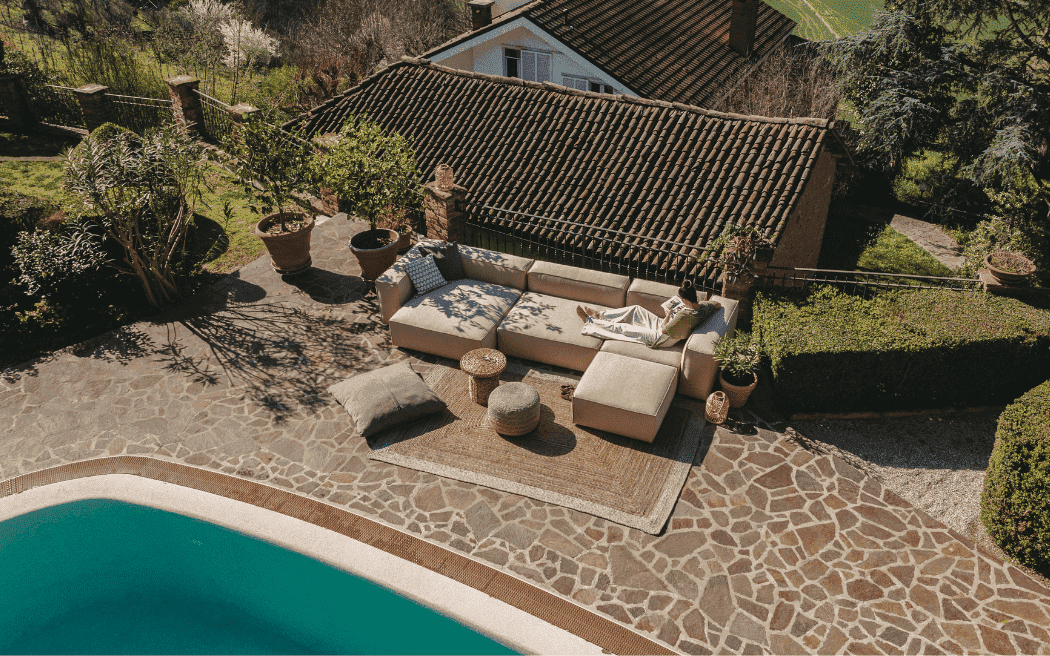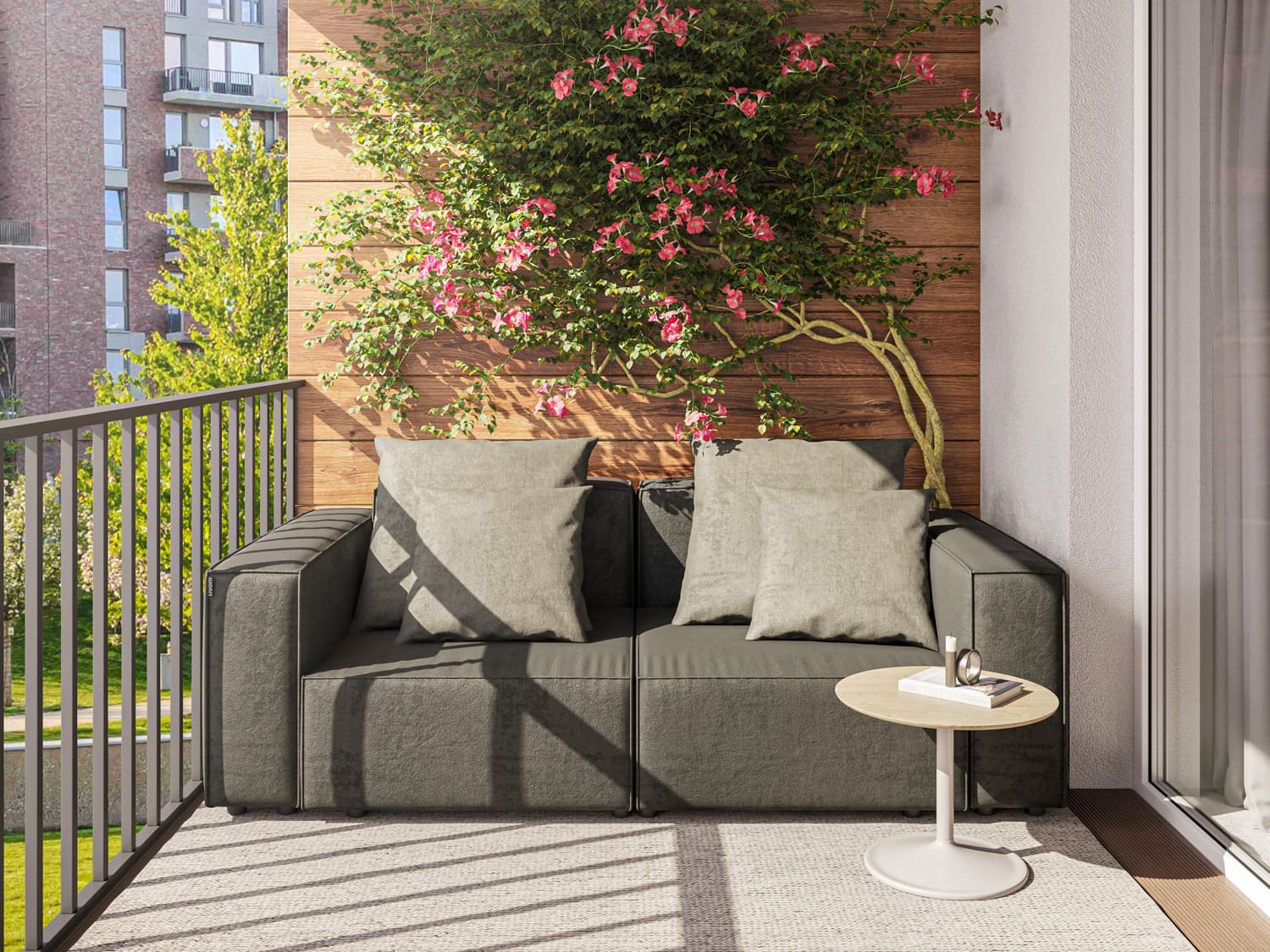It might not be the first thing you think of when buying a sofa, but even with furniture, the issue of sustainability has become more important. And for good reason: conscious and responsible consumption is important not only for ourselves, but also for the environment. A sustainable sofa is not only good for your conscience, but also protects your health and gives you years of enjoyment.
But what should you look for when buying a sustainable sofa? What distinguishes true sustainability from mere "greenwashing"? In this guide, we'll show you what to look for when buying a sustainable sofa and why Livom sofas might be the right choice.
Livom is a young furniture manufacturer committed to sustainability and responsible consumption. Their goal is to communicate more about the origins and production of their products, ensuring they consciously choose local materials. Unlike many other furniture manufacturers, Livom relies on European woods such as oak, beech, spruce, and larch. The tropical woods otherwise commonly used are often produced under poor conditions in far-flung countries and burden the environment on long transport routes.
Livom works closely with select furniture manufacturers in Europe to keep transport routes as short as possible and to actively contribute to environmental and climate protection. The company aims to make furniture production and processing as transparent as possible and thus contribute to a social shift towards responsible consumer behavior.
Sustainability in furniture production
The concept of sustainability in furniture production isn't new, but it has become increasingly important in recent years. Sustainability means using the resources used in furniture production as efficiently as possible to minimize negative impacts on the environment and society.
One aspect of sustainable furniture production is the use of wood from sustainably managed forests. Sustainable forestry protects the natural habitats of animals and plants and simultaneously offsets wood consumption through regular reforestation. Other aspects of sustainable furniture production include the use of environmentally friendly materials, such as recycled plastics and metals, as well as the use of renewable energy sources in both the production and transportation of furniture.
Producing sustainable furniture means even more: furniture manufacturers must also uphold their social responsibility. This means that companies ensure that the workers involved in production receive consistently fair wages and good working conditions.
Sustainable production
The decisive factor in choosing a sustainable sofa is probably the production method. Therefore, ensure that the piece of furniture is made under the most environmentally friendly conditions. This requires, among other things, regional production chains, adherence to high technical standards, and the elimination of many of the chemicals used in traditional furniture production.
Livom benches are not only produced in Europe, which means exceptionally short transport routes and massively reduces CO2 emissions during production; LIVOM's production facilities are also 100% solar-powered. Furthermore, Livom committed to reducing chemical use in furniture production many years ago.
Use of sustainable materials
Another important criterion in the search for a sustainable sofa is the use of sustainable materials. These materials include, for example, wood, which comes from responsible sources and therefore contains few pollutants.

Livom benches are made from FSC-certified wood, sourced from carefully selected forestry companies that contribute to sustainable forest management. Livom also adheres to the Öko-Tex Standard 100 during the production of its covers, which guarantees that the covers are free from pollutants and therefore suitable for allergy sufferers.
Lifespan and repairability
To ensure you and your loved ones enjoy your sofa for a long time, it should last as long as possible. Any damage that may occur should also be easy to repair.
A sofa's lifespan is influenced by numerous factors. One of these is the quality of the materials used. High-quality materials such as durable wood or hard-shell covers help ensure that a piece of furniture retains its quality for decades—both visually and functionally. Posmopold also plays a crucial role: sofas with removable, machine-washable covers can be kept hygienically clean and remain in pristine condition for longer.
Livom sofas are exceptionally durable because they are made of high-quality materials and carefully crafted. They have removable, machine-washable covers and are therefore particularly easy to maintain. Livom also offers the option of replacing individual covers or modules instead of replacing the entire sofa. This means you can always repair your sofa instead of buying a new one when the initial damage occurs.
Modularity as a sustainability factor
To ensure a high degree of longevity, sustainable sofas are usually modular. Modularity means that the furniture consists of individual parts that can be replaced independently. This offers several advantages that are particularly appealing to sustainability-conscious buyers.
A key advantage of modularity is that you can adapt the sofa to your needs at any time. For example, you can expand it to create more space or modify it to better integrate into your living room. Furthermore, the entire sofa doesn't need to be replaced in case of damage or wear; simply swap out the affected module. This not only saves money but also reduces waste and thus the environmental impact.
Livom sofas have always been considered exceptionally modular. They offer buyers various ways to customize their sofas, ensuring they always meet their individual needs. So you don't have to sell or even remove your sofa before moving, but can fit it perfectly into your new home.
Easy to maintain
Another important criterion when choosing a sofa is ease of care. The easier a sofa is to maintain, the less often it needs to be cleaned and the fewer signs of wear and tear it will show. A factor that influences sofa care is the materials used. Lightweight fabrics like synthetic leather or microfiber can be easily wiped down with a damp cloth and are particularly difficult to maintain. Removable covers also contribute to sofa care, as they are easily machine washable. This allows you to keep your sofa hygienically clean and in pristine condition for a long time.
Livom sofas are exceptionally easy to care for, as they're made of high-quality materials and have removable covers that are machine washable at 30 degrees Celsius. Unlike many other sofas, they're therefore easy to clean and will remain visually pristine for decades.
Sustainable commitment
The manufacturer's sustainable commitment beyond the transformation of production processes is also crucial. Livom plants two trees for every sofa sold to make an additional contribution to climate protection. This commitment helps further reduce CO2 emissions and preserve the forest stock.
Summary
If you're looking for a sustainable sofa, you should consider several different criteria. Sustainable production, the type of materials used, and the durability and repairability of the piece are particularly important. Modularity and care also play a significant role.
As a sustainable furniture manufacturer, Livom fulfills all these needs from the ground up. Livom sofas are therefore the perfect choice for anyone who places a special emphasis on sustainability and environmental protection. The furniture is produced in Europe and exclusively with renewable energy sources; the wood used comes from responsible forestry companies, and the references meet the highest environmental standards. Livom sofas are also exceptionally durable and easy to repair.
We hope this guide will help you find a sustainable sofa. Perhaps you'll even choose a Livom sofa: you'll not only enjoy it, but you'll also make a significant contribution to environmental protection.
Sustainable furniture checklist
In summary, a checklist you can use when looking for a sustainable bank:
- Inquire about the production conditions and the materials used. Ensure that the sofa was manufactured under the most environmentally friendly conditions and that the manufacturer uses regional production chains.
- Make sure the sofa comes from a manufacturer that maintains high technical standards in production and uses as few chemicals as possible.
- Choose a bench made from sustainable materials, such as oak, beech, or spruce, instead of tropical wood. The latter are often produced under poor conditions in far-flung countries and put a strain on the environment during long transport routes.
- Pay attention to certificates, such as the FSC SEAL.
- Make sure the sofa is as durable and easy to repair as possible. Ideally, buy a modular piece of furniture. This conserves resources and helps reduce waste.
- Inquire with the manufacturer and check whether they provide transparent information about their production conditions and materials. A company that is open about its practices often maintains higher standards.
- Choose a sofa that suits your lifestyle and needs. A sustainable sofa you don't use isn't a sustainable sofa at all.
- Use this opportunity to share your decision to buy sustainable furniture and inspire others to consume sustainably. Every decision counts and can contribute to a more sustainable future.
FAQ
What does sustainability mean in banks?
Sustainability in sofas is primarily defined by production and the type of materials used. Production chains should be designed as regionally as possible, and individual production facilities adhere to high technical standards. Furthermore, minimal chemicals should be used in production. Unlike conventional sofas, a sustainable piece of furniture is made from sustainable materials such as oak, beech, spruce, or larch.
How can I ensure I buy a sustainable sofa?
A key factor when buying a sustainable sofa is the manufacturer's transparency. Therefore, inquire about the production conditions and the materials used in the sofa's manufacture. Consulting environmental standards and certifications, such as those from the FSC (Forest Stewardship Council), can also be an indicator of sustainable production practices.
Why are Livom benches particularly sustainable?
Livom is a young Swiss furniture manufacturer committed to sustainability and responsible consumption. Its sofas are produced exclusively in Europe, ensuring short transport routes and low CO2 emissions. Furthermore, 100% of Livom's production facilities are solar-powered, and the company has committed to reducing chemicals in furniture production. Livom sofas are made of sustainable materials and come with easy-care covers.


